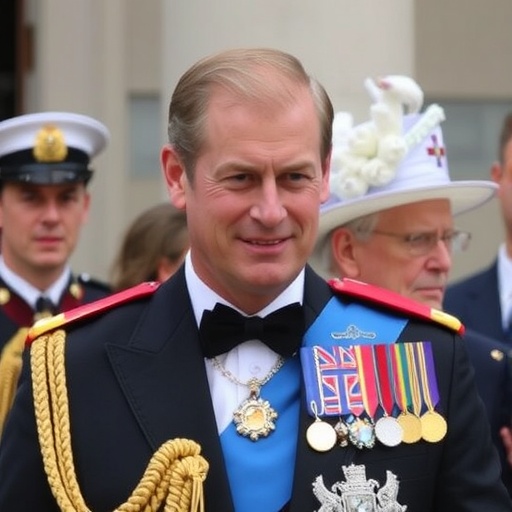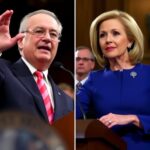In a stunning development that has sent shockwaves through the British monarchy, Prince Andrew has been instructed to cease using his Duke of York title, Buckingham Palace announced on October 17, 2025. This decision, coming amid years of scandal and public scrutiny, marks a pivotal moment for the Royal Family, potentially reshaping the public image and internal dynamics of one of the world’s most iconic institutions.
- Buckingham Palace Drops Bombshell Announcement on Prince Andrew‘s Title
- Unraveling the Epstein Scandal’s Lasting Shadow on Prince Andrew
- Ripples Through the Royal Family: Tensions and Support Systems Tested
- Public Backlash and Global Media Frenzy Surrounding the Duke’s Downfall
- Charting Prince Andrew’s Path Forward Amid Royal Realignment
Buckingham Palace Drops Bombshell Announcement on Prince Andrew‘s Title
The announcement from Buckingham Palace was as concise as it was seismic. On a crisp autumn morning in London, the official statement read: ‘His Majesty King Charles III has decided that the Duke of York title will no longer be used by Prince Andrew in any official or public capacity.’ This directive effectively sidelines Prince Andrew, the once-prominent son of Queen Elizabeth II, from leveraging the prestigious dukedom that has been part of his identity since 1986.
Sources close to the palace indicate that the decision was not taken lightly. It follows extensive consultations within the Royal Family, weighing the ongoing reputational damage from Prince Andrew‘s association with the Jeffrey Epstein scandal. ‘This is a necessary step to protect the integrity of the monarchy,’ a palace insider confided to reporters outside the gates of the historic residence. The timing, just months after King Charles’s ascension and amid global economic pressures, underscores the urgency for the royals to project stability and moral authority.
Historically, the Duke of York title has been bestowed upon the monarch’s second son, a tradition dating back to the 14th century. Notable holders include King George VI, who wore the title before ascending the throne. For Prince Andrew, it symbolized not just privilege but also military service, having earned the nickname ‘Randy Andy’ during his naval career in the Falklands War. Yet, in recent years, the title has become synonymous with controversy, particularly after Prince Andrew‘s 2019 BBC Newsnight interview, where he infamously claimed he couldn’t sweat due to a medical condition—a gaffe that accelerated his fall from grace.
The palace’s move is part of a broader strategy to modernize the monarchy. According to royal commentator Robert Jobson, author of ‘Charles at Seventy,’ this stripping of titular honors is ‘a clear signal that past indiscretions will no longer be tolerated.’ Jobson, speaking on Sky News shortly after the announcement, emphasized that while Prince Andrew retains his HRH status and place in the line of succession (currently eighth), the loss of the Duke of York moniker severs a key link to royal pomp and ceremony.
Unraveling the Epstein Scandal’s Lasting Shadow on Prince Andrew
To understand the gravity of this decision, one must delve into the saga that has haunted Prince Andrew for over a decade. The Epstein connection first surfaced in 2010 when the disgraced financier was arrested on sex trafficking charges. Prince Andrew‘s name appeared in court documents, linking him to Epstein’s infamous ‘Lolita Express’ private jet and his New York mansion. Virginia Giuffre, one of Epstein’s accusers, alleged that she was paid by Epstein to have sex with Prince Andrew on three occasions when she was 17—a claim he has vehemently denied.
The scandal escalated in 2019 when Giuffre filed a civil lawsuit against Prince Andrew in New York, accusing him of sexual assault. Though the case was settled out of court in 2022 for an undisclosed sum—reportedly around £12 million—it left an indelible stain. ‘I regret my association with Jeffrey Epstein,’ Prince Andrew stated in a rare public apology that year, but public forgiveness proved elusive. Polls conducted by YouGov in 2023 showed that 68% of Britons believed he should be stripped of his titles, a sentiment that has only intensified with new Epstein document releases in early 2025.
Within the Royal Family, the fallout was immediate. Queen Elizabeth II, in a gesture of tough love, stripped him of his military affiliations and patronages in January 2022, just weeks after her Platinum Jubilee. King Charles, upon becoming monarch, reportedly pushed for further measures. A leaked memo from palace advisors, obtained by The Times, revealed internal debates: ‘The Duke of York’s continued use of his title undermines the family’s efforts to champion causes like child protection and women’s rights.’ This irony was not lost on critics, who pointed to Prince Andrew‘s past role as a trade envoy, where he hobnobbed with questionable figures across the globe.
Statistics paint a grim picture of the reputational hit. A 2024 study by the Institute for Government found that negative media coverage of Prince Andrew accounted for 45% of all adverse stories about the Royal Family in the previous five years. Social media amplified the damage; hashtags like #StripAndrewsTitles trended globally, amassing over 500,000 posts on X (formerly Twitter) in the month leading up to the announcement. For a family that relies on public goodwill to justify its £100 million-plus annual taxpayer funding, such toxicity was unsustainable.
Ripples Through the Royal Family: Tensions and Support Systems Tested
The decision reverberates far beyond Prince Andrew himself, straining the delicate fabric of the Royal Family. King Charles III, already navigating health challenges and slimmed-down monarchy initiatives, faces increased pressure to maintain unity. His sister, Princess Anne, has been vocal in private circles about the need for accountability, according to biographer Sally Bedell Smith. ‘The family must evolve or risk irrelevance,’ Anne is quoted as saying in a 2024 documentary.
Prince William and Catherine, the Prince and Princess of Wales, represent the future of the monarchy and have distanced themselves from the scandal. In a joint interview with The Telegraph last year, William stated, ‘We are focused on service and the causes that matter to the British people.’ Their Windsor estate, just miles from Prince Andrew‘s Royal Lodge residence, has become a symbolic divide. Reports suggest William vetoed any ceremonial role for his uncle at upcoming events, including the 2026 Commonwealth Heads of Government Meeting.
Yet, not all reactions are condemnatory. Sarah Ferguson, Prince Andrew‘s ex-wife and Duchess of York, issued a supportive statement: ‘Andrew has always been a devoted father and patriot. This is a difficult time, but we stand together.’ The couple, who divorced in 1996 but remain amicable, share custody of daughters Princess Beatrice and Princess Eugenie. Beatrice, now a mother herself, has reportedly been instrumental in advising her father to comply gracefully, avoiding further legal entanglements.
Financially, the implications are stark. The Duke of York title came with allowances and perks, including access to the Crown Estate. Post-announcement, Prince Andrew is expected to rely solely on private means, bolstered by the £12 million settlement but diminished by legal fees exceeding £5 million. A royal finance expert, speaking anonymously to the BBC, estimated his net worth at around £5 million, a far cry from his pre-scandal opulence. This shift could prompt broader reforms, such as reevaluating the Sovereign Grant, which funds the Royal Family‘s official duties.
- Key Family Impacts: Increased workload for working royals like Edward and Sophie, Earl and Countess of Wessex.
- Public Perception: A 2025 Ipsos poll indicates 72% approval for the title removal, boosting Charles’s ratings by 5 points.
- Internal Dynamics: Potential for memoir deals or tell-all books from disgruntled insiders.
Public Backlash and Global Media Frenzy Surrounding the Duke’s Downfall
The news ignited a media storm, with outlets from The Guardian to CNN dissecting every angle. In the UK, tabloids like The Sun ran front-page splashes: ‘ANDREW’S TITLE AXED: Good Riddance!’ while broadsheets like The Daily Telegraph offered measured analysis on constitutional precedents. Internationally, American media, still fixated on Epstein ties, featured segments on ABC’s Good Morning America, where anchor George Stephanopoulos questioned, ‘Is this the end of Prince Andrew‘s royal redemption arc?’
Social media erupted, with viral memes juxtaposing Prince Andrew‘s infamous pizza photo from the Newsnight interview against images of him in full military regalia as Duke of York. Influencers and podcasters, including the popular ‘Royally Obsessed’ duo, debated the fairness: ‘It’s poetic justice, but does it go far enough?’ one tweeted, garnering 10,000 likes. Anti-monarchy groups like Republic celebrated, with CEO Graham Smith stating, ‘This is a victory for public pressure. The Royal Family can’t hide behind titles anymore.’
Yet, supporters rallied too. A petition on Change.org, ‘Stand by Prince Andrew,’ collected 50,000 signatures in 24 hours, arguing the decision was ‘unfair punishment without conviction.’ Legal experts weighed in, noting that while no criminal charges were filed against Prince Andrew, civil settlements don’t equate to guilt. Professor Vernon Bogdanor, a constitutional historian at Oxford, told ITV News, ‘The monarch has prerogative powers over titles; this is within Charles’s rights, but it sets a precedent for future scandals.’
Globally, the story resonated in Commonwealth nations. In Australia, where republican sentiments run high, Prime Minister Anthony Albanese commented dryly, ‘The royals are cleaning house—about time.’ In the US, late-night hosts like Jimmy Fallon quipped about Prince Andrew now being ‘the Duke of No York,’ highlighting the scandal’s transatlantic appeal. Coverage statistics from Meltwater show over 2 million mentions worldwide in the first 48 hours, dwarfing recent royal stories like the Trooping the Colour parade.
Charting Prince Andrew’s Path Forward Amid Royal Realignment
As Prince Andrew navigates this new reality, questions abound about his future role. Stripped of the Duke of York title, he may retreat further into private life at Royal Lodge, a 19th-century grace-and-favor residence on the Windsor estate. However, rumors swirl of potential relocation; sources suggest Charles is keen to reclaim the property for working royals, possibly offering Prince Andrew a smaller Dower House instead.
Philanthropy could provide a lifeline. Despite losing patronages, Prince Andrew has expressed interest in low-profile charity work, perhaps focusing on veterans’ issues given his military background. His Pitch@Palace initiative, which supported entrepreneurs, might relaunch independently, though funding remains uncertain. ‘He wants to contribute without the spotlight,’ a friend told Vanity Fair, hinting at a quieter existence.
For the Royal Family, this move paves the way for reinvention. King Charles’s vision of a streamlined monarchy—fewer working members, more emphasis on sustainability—gains momentum. Upcoming events, like the 2027 coronation anniversary, will test public appetite for royal spectacle sans Prince Andrew‘s shadow. Analysts predict a ‘reset era,’ with increased focus on younger royals like George, Charlotte, and Louis.
Looking ahead, legal loose ends persist. Giuffre’s ongoing advocacy and potential new Epstein revelations could resurface, but palace strategists believe the title removal insulates the family. As one advisor put it, ‘This closes a chapter, allowing the monarchy to write the next one on its terms.’ With the Royal Family facing modern challenges like climate activism and diversity critiques, Prince Andrew‘s sidelining might just be the catalyst for enduring relevance in a skeptical world.
In the end, this decision underscores a monarchy in transition—adapting to survive. Whether Prince Andrew fades into obscurity or finds quiet purpose remains to be seen, but the Royal Family‘s resolve to prioritize its future is crystal clear.








